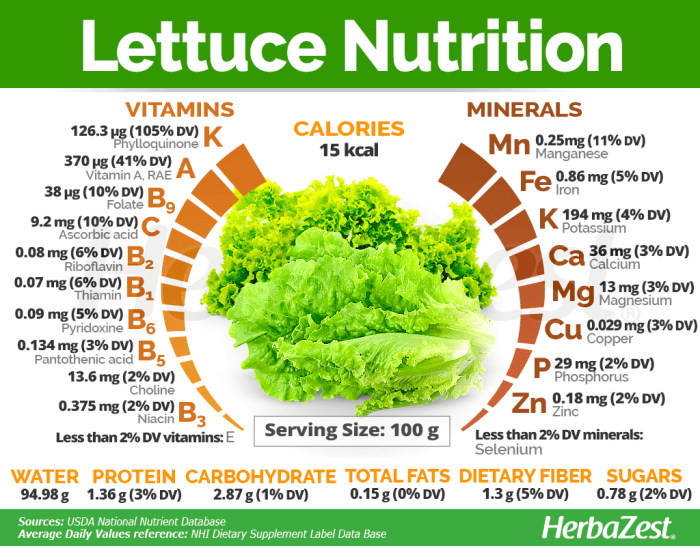Nutritional Composition of Butter Lettuce

Butter lettuce nutrition facts – Butter lettuce, known for its delicate flavor and tender leaves, offers a surprisingly robust nutritional profile. While often overlooked in favor of its more robust cousins, butter lettuce provides a valuable contribution to a healthy diet, particularly in terms of vitamins, minerals, and fiber. Let’s delve into the specifics of its nutritional makeup.
Macronutrient Breakdown of Butter Lettuce
The macronutrient content of butter lettuce is relatively low, making it a suitable choice for those watching their calorie intake. However, the small amounts of carbohydrates, protein, and fat present still contribute to overall nutritional value.
| Nutrient | Amount (grams) | Amount (% Daily Value) | Unit |
|---|---|---|---|
| Carbohydrates | 1.9 | <1 | g/100g |
| Protein | 1.5 | <1 | g/100g |
| Fat | 0.2 | <1 | g/100g |
Micronutrient Content of Butter Lettuce
Butter lettuce is a good source of several essential vitamins and minerals. These micronutrients play crucial roles in various bodily functions, contributing to overall health and well-being.
Butter lettuce, a low-calorie, nutrient-rich option, offers a significant contrast to the higher-calorie fare found in fast food meals. For example, consider the nutritional breakdown of a mcchicken 5 dollar meal nutrition facts , a popular choice often higher in sodium and fat. Returning to the lighter side, butter lettuce provides essential vitamins and minerals, making it a healthier choice for those watching their intake.
A 100g serving of butter lettuce typically contains:
- Vitamin A: Significant amounts, contributing to eye health and immune function.
- Vitamin C: A moderate amount, supporting immune function and collagen production.
- Vitamin K: A notable amount, vital for blood clotting and bone health.
- Folate: A good source, crucial for cell growth and development.
- Potassium: Contributes to maintaining healthy blood pressure.
- Calcium: Supports bone health and muscle function.
- Magnesium: Involved in numerous metabolic processes.
Fiber Content and Digestive Health
Butter lettuce is a source of dietary fiber, primarily insoluble fiber. Insoluble fiber adds bulk to the stool, promoting regular bowel movements and preventing constipation. This is crucial for maintaining a healthy digestive system and preventing digestive disorders. Adequate fiber intake is also associated with a reduced risk of certain chronic diseases, including heart disease and type 2 diabetes.
The fiber content in butter lettuce, though not exceptionally high compared to other leafy greens, still contributes positively to overall digestive health.
Nutritional Comparison of Different Lettuce Types
While butter lettuce shines in its own right, comparing it to other common lettuces provides further context to its nutritional profile. The following table highlights some key differences:
| Lettuce Type | Vitamin A (mcg) | Vitamin C (mg) | Fiber (g) |
|---|---|---|---|
| Butter Lettuce | 200-300 | 5-10 | 1-2 |
| Romaine Lettuce | 800-1000 | 8-12 | 2-3 |
| Iceberg Lettuce | 10-20 | 2-4 | 0.5-1 |
Health Benefits Associated with Butter Lettuce Consumption

Butter lettuce, with its delicate flavor and crisp texture, offers more than just a refreshing addition to salads. Its nutritional profile contributes to several aspects of overall health and well-being, making it a valuable component of a balanced diet. Beyond its culinary appeal, butter lettuce boasts a range of potential health benefits, stemming from its unique nutrient composition.
Weight Management Benefits of Butter Lettuce
Butter lettuce is exceptionally low in calories and high in water content. This combination makes it an ideal food for those seeking to manage their weight. The high water content contributes to satiety, helping you feel fuller for longer on fewer calories. For example, a cup of chopped butter lettuce contains approximately only 8 calories, while providing a significant volume.
This helps to displace higher-calorie foods in your diet, contributing to a calorie deficit necessary for weight loss. The high fiber content further aids in digestion and can promote feelings of fullness.
Antioxidant Properties and Overall Health, Butter lettuce nutrition facts
Butter lettuce contains various antioxidants, including beta-carotene and vitamin C. These antioxidants combat free radicals, unstable molecules that can damage cells and contribute to chronic diseases. Beta-carotene, a precursor to vitamin A, plays a crucial role in maintaining healthy vision and immune function. Vitamin C is essential for collagen production, wound healing, and boosting the immune system’s ability to fight off infections.
Regular consumption of butter lettuce can help protect against oxidative stress and contribute to overall cellular health.
Cardiovascular Health Benefits of Butter Lettuce
The potassium and fiber content of butter lettuce contribute positively to cardiovascular health. Potassium helps regulate blood pressure, reducing the strain on the heart. Adequate potassium intake is crucial for maintaining a healthy heart rhythm and reducing the risk of stroke. Fiber, on the other hand, helps lower cholesterol levels by binding to cholesterol in the digestive tract and preventing its absorption into the bloodstream.
This, in turn, reduces the risk of atherosclerosis and other cardiovascular diseases. A diet rich in potassium and fiber, such as one incorporating butter lettuce, can significantly improve heart health.
Other Potential Health Benefits of Butter Lettuce
Beyond weight management, antioxidant support, and cardiovascular health, butter lettuce offers additional potential benefits. Its high water and fiber content promote healthy digestion, preventing constipation and supporting regular bowel movements. Furthermore, the vitamins and minerals present in butter lettuce, such as vitamin K and folate, contribute to various bodily functions, including blood clotting and cell growth. These nutrients support overall health and well-being, contributing to a robust immune system and a reduced risk of certain health issues.
Answers to Common Questions: Butter Lettuce Nutrition Facts
Can butter lettuce be cooked?
Yes, while often consumed raw in salads, butter lettuce can be gently cooked in dishes where its delicate texture will hold up well. Avoid overcooking, as it will become wilted and lose its nutritional value.
How long does butter lettuce last in the refrigerator?
Properly stored in an airtight container or resealable bag, butter lettuce typically lasts for 3-5 days in the refrigerator. For extended freshness, consider storing it in a plastic bag with paper towels to absorb excess moisture.
Is butter lettuce a good source of protein?
While not a significant source of protein, butter lettuce does contain a small amount. It is best considered a source of vitamins, minerals, and fiber, rather than a significant protein contributor.
Are there any potential allergens associated with butter lettuce?
Butter lettuce is generally considered a hypoallergenic food. However, individuals with known allergies to other members of the lettuce family should exercise caution.
